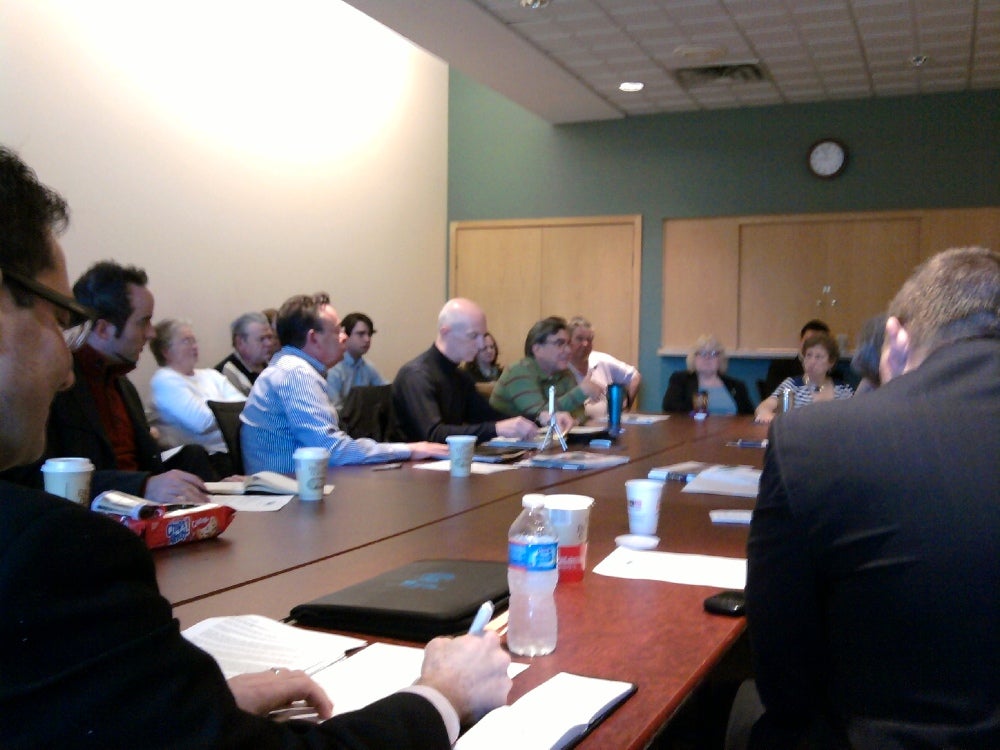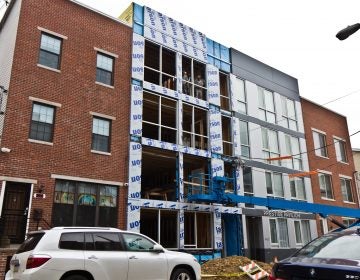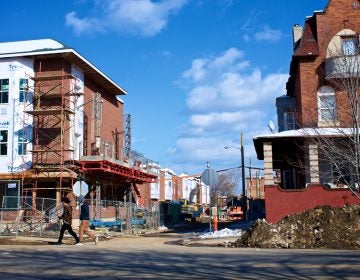First District city council candidates answer Central Delaware Waterfront questions at forum

The four men vying for Philadelphia’s first district city council seat fielded questions Thursday about how they would encourage development that is consistent with the long-range vision for the Central Delaware Waterfront.
At a candidates forum held by the Central Delaware Advocacy Group, Vern Anastasio, Joe Grace, Jeff Hornstein and Mark Squilla also took questions about the role they would take in turning the guidelines established in the nearly-finished master plan for the redevelopment of the waterfront into city code. CDAG also wanted the candidates to commit to refraining from introducing bills to create exemptions from the master plan-related codes.
The morning started off with PennPraxis Executive Director Harris Steinberg giving an overview of the public process that led to the Central Delaware Master Plan, which is nearing completion and will be released to the public in June. Both he and CDAG Chairman Steve Weixler gave shout-outs to retiring First District Councilman Frank DiCicco, who pushed the Street and Nutter administrations toward a new waterfront plan. The first district includes most of the Central Delaware Waterfront.
Steinberg gives history of the Central Delaware plan.
Steinberg said it was the community groups that pushed DiCicco, though. And Weixler told the candidates that whoever wins DiCicco’s spot should anticipate continued pressure from CDAG and the waterfront communities CDAG represents.
Each candidate got a few minutes to introduce himself, then answered the same three questions before facing various questions from the audience.
Anastasio, who 17 years ago founded the Bella Vista United community organization, talked about his role in the fight to keep Foxwoods Casino from Columbus Boulevard and Reed Street. “I’m proud to be the only first district council candidate who organized early on against waterfront casinos,” he said. Moving forward, he said he would work to make sure SugarHouse doesn’t expand.
A real estate attorney by trade, he said he understood the importance of “letting the development community know we’re not anti-development.” Keeping development away would be keeping jobs away, he said. But he also said he wants an “emerald necklace” of green space along the seven miles of the Central Delaware Waterfront. “Every city needs lungs,” he said. And east side residents don’t have the green space that those who live closer to the Schuylkill do, he said, but through the master plan, they could. Any development, whether commercial, industrial or residential, can have green elements, Anastasio said.
Anastasio said he was “looking forward to pushing the vision” the public came up with for the waterfront and he would “work everyday to make this waterfront the gem of the city of Philadelphia.”
Anastasio’s complete Q&A
If elected, Anastasio said he would not not introduce any legislation that creates an exception to the codified master plan. “I don’t believe in exceptions. I don’t believe in spot zoning,” he said.
Grace, a former city of Philadelphia spokesman who worked for the city when the Street administration started the waterfront planning process, said it is exciting to see the city turn back toward the river, after turning its back on it for so long. Until recently, Grace was executive director of CeaseFirePA, the state’s largest gun violence prevention organization.
Grace’s complete Q&A
Grace said the city already has plenty of tourist attractions, and he didn’t see the need for any more on the waterfront.
Grace said as a councilman, it would be important to him to listen to each community on the waterfront, and the communities might have somewhat different desires. “I think I need to be open and flexible,” he said. And that could require an exception to city code. But in response to a question from Queen Village resident and CDAG representative Richard Wolk, Grace clarified that he would not be seeking out exceptions. He just wanted it understood that “if people come in with an idea, I’m opening to listening to that idea.”
CDAG member Laura Lanza, who lives in the Port Richmond area, asked Grace what he would do about extending the street grid to the waterfront – especially considering that the streets would have to largely be extended through what is now privately owned property. Grace said he thinks extending the streets is a “central element” of bringing people back to the waterfront. He said he would make it happen, despite the private ownership issues, with “a lot of hard work.”
Hornstein’s complete Q&A
Hornstein, who helped organize his fellow graduate assistants at the University of Maryland into a union and for the past six years he has been organizing Philadelphia janitors for SEIU Local 32BJ, said he is running for council to boost economic development in Philadelphia. He said if elected, he wants to take steps to prevent land owners from sitting on waterfront land without developing it and without paying much in taxes. Hornstein said the new zoning code should not be passed until the waterfront master plan is adopted. Hornstein also said CDAG should have a position on the board of the Delaware River Waterfront Corporation, the organization overseeing the master plan process. He said he did not understand why CDAG didn’t have a seat.
“Neither do we,” quipped CDAG member Rene Goodwin.
Squilla, who has been a CDAG member as a representative of Whitman Council, of which he was president until he resigned to run for office. Squilla, a systems analyst for the Auditor General’s Office in the Commonwealth of Pennsylvania, said to encourage development along the waterfront, he would be sure that developers have a clear sense of what they can and can’t do with their properties. Developers and land owners he has talked to during his campaign say the overlay and master plan still leave them uncertain, he said. And some feel the city is headed toward something too restrictive.
Squilla’s complete QnA
CDAG member Joe Schiavo asked Squilla how that would prompt developers to move forward. For decades, Schiavo said, the city was “very permissive” when it came to waterfront development and very little was done. “So how do we get it to move forward?” he asked.
Squilla said the new zoning guidelines should show developers what is expected for waterfront development, and then they “are either willing to do it under those guidelines or they can sell.”
Either a new tax structure with higher taxes for vacant land or the legislative creation of a time frame by which they must develop or sell could force movement, Squilla said.
Reach the reporter at kgates@planphilly.com.
WHYY is your source for fact-based, in-depth journalism and information. As a nonprofit organization, we rely on financial support from readers like you. Please give today.






